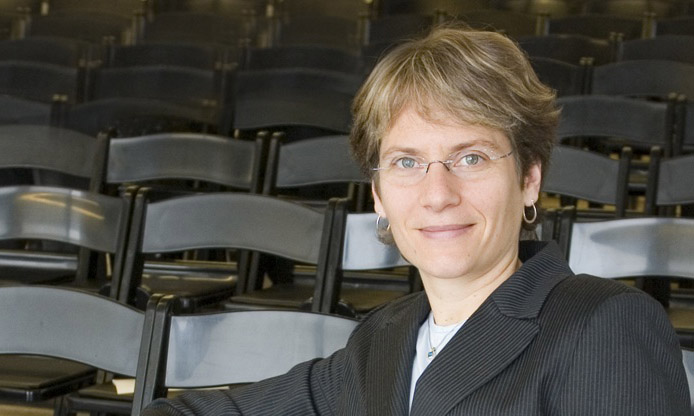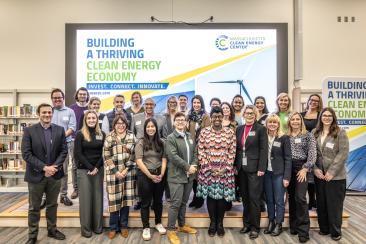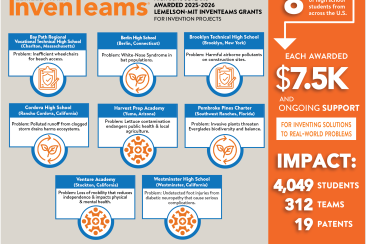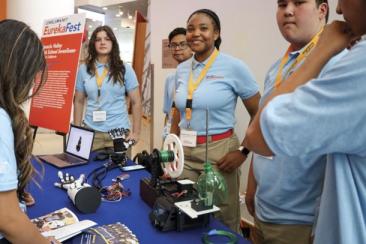Chemical Biologist and Entrepreneur Carolyn Bertozzi Awarded Lemelson-MIT Prize

Internationally renowned chemical biologist Carolyn Bertozzi, whose research is applied in the biopharmaceutical industry, has achieved extraordinary success for her inventions in the field of biotechnology.
Cambridge, Mass. (June 2, 2010) – Internationally renowned chemical biologist Carolyn Bertozzi, whose research is applied worldwide in the biopharmaceutical industry, has achieved extraordinary success for her pioneering inventions in the field of biotechnology. The proven potential for future advances, and her current work manipulating processes within living cells to engineer their surfaces and secreted proteins, have won Bertozzi the prestigious 2010 $500,000 Lemelson-MIT Prize. She will accept the prize and present her accomplishments to the public at the Massachusetts Institute of Technology during the Lemelson-MIT Program’s fourth-annual EurekaFest, a multi-day celebration of the inventive spirit, June 16 – 19.
Bertozzi’s ability to identify unmet needs and craft innovative solutions has led to scientific advances with a broad range of applications. Chemical insights gleaned by Bertozzi have progressed efforts to diagnose and treat diseases such as cancer, inflammatory disorders such as arthritis, and infectious diseases like tuberculosis. Her multi-disciplinary approach has led to significant developments in the ability to engineer living cells and the proteins they produce with defined chemical properties. As a University of California, Berkeley Professor and Director of the Molecular Foundry at the Lawrence Berkeley National Laboratory, Bertozzi and her team study the biology of glycans, also known as complex carbohydrates, and develop nanotechnologies for probing biological systems.
Paving a Path in a Burgeoning Field
Bertozzi invented the world’s first bioorthogonal chemical reaction, a technology for labeling biomolecules in living cells or animals. This form of labeling is a novel approach that allows researchers to specifically target cells and their functions for gene delivery and anti-tumor diagnostics. Bertozzi utilizes these reactions in her work toward imaging glycans on tumor cells, a technology that has the potential to facilitate early cancer detection. She also invented the genetically-encoded aldehyde tag technology, affording scientists with a simple method for precision protein engineering, creating an approach for the development of novel protein drugs.
Other projects Bertozzi holds patents for include a cell nanoinjector, an instrument that introduces molecules into living cells via a “nanoneedle,” as well as artificial bone materials, targets for tuberculosis therapy and cell microarray platforms.
Leading the Way as a Mentor and Entrepreneur
Many of Bertozzi’s revolutionary projects and findings have been achieved through her work as T.Z. and Irmgard Chu Distinguished Professor of Chemistry and Professor of Molecular and Cell Biology at the University of California, Berkeley, Senior Faculty Scientist in the Materials Science Division at the Lawrence Berkeley National Laboratory, Professor of Molecular and Cellular Pharmacology at the University of California, San Francisco, and as a Howard Hughes Medical Institute Investigator.
Bertozzi attributes a number of her innovations and research successes to the students and postdoctoral fellows whom she mentors – over the span of her career she has trained more than 130 coworkers including undergraduates, graduate students and postdoctoral fellows. She also created the University of California, Berkeley Chemical Biology Graduate Program.
“Carolyn Bertozzi takes scientific development to a new level; beyond her extraordinary gift as a researcher and innovator, she collaborates with her students to push into new frontiers,” states Michael J. Cima, faculty director of the Lemelson-MIT Program. “As a mentor, she engages those around her to develop new, creative ideas, ensuring a future pipeline of scientists, inventors and policy makers.”
Lab to Marketplace Commercialization and Adoption
As a testament to her teaching abilities and mentoring skills, as well as her true entrepreneurial spirit, Bertozzi founded biotech start-up Redwood Bioscience in 2008 with her former graduate student, Dr. David Rabuka. The company, structured around Bertozzi’s advancements with the genetically-encoded aldehyde tag technology, is developing novel protein drugs with properties that conventional molecular biology approaches cannot achieve. The company was recently awarded a prestigious National Institutes of Health (NIH) Challenge Grant, bringing $1 million into the company over two years, and has raised funds from the private sector as well.
According to Professor Miquel Salmeron, director of the Materials Science Division at the Lawrence Berkeley National Laboratory, Bertozzi “transformed the field of chemical biology, creating new industries along the way, and bringing new innovations to fields as disparate as nanoscience, tuberculosis therapy, and bone tissue engineering.” He adds, “She also has an outstanding record of teaching, mentorship, and service to the community.”
With more than 225 publications to her name, a prestigious election to the National Academy of Sciences, and becoming one of the youngest recipients ever of a MacArthur “Genius” Award, Bertozzi has also been hailed with recognition by the American Chemical Society and selected as a Presidential Early Career Award in Science and Engineering.





